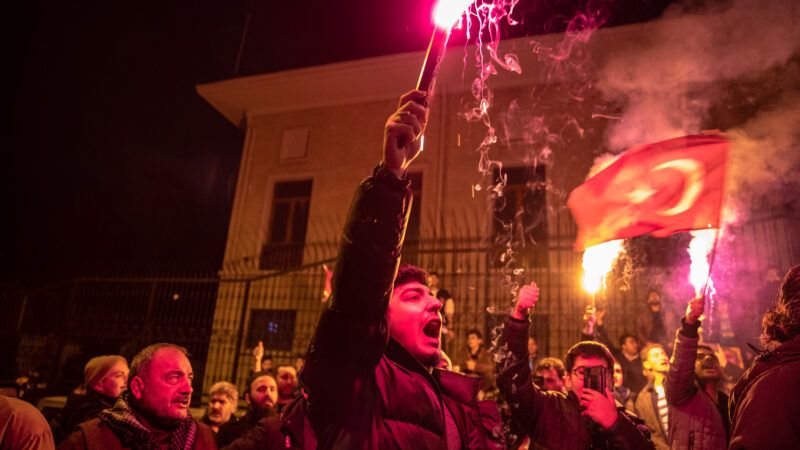Denmark May Ban Burning the Quran
A cabinet minister who once defended the right to blaspheme now wants a crackdown.

In 2017, then–Danish Prime Minister Lars Løkke Rasmussen proclaimed: "I'm proud and happy that we live in a country where we have abolished the blasphemy provision and where you're allowed to be critical—even in satire and cartoons—of religious symbols." Last week, however, Rasmussen, who is now the minister of foreign affairs, did an about-face.
The Quran burnings have become so bad, he said, that Denmark is "seen as a country that supports the insult and denigration of other countries and religions." In response, Rasmussen announced legislation "that will allow us to put a stop to the kind of insult and denigration we are currently witnessing."
The bill criminalizes the "improper treatment of objects of significant religious importance to religious communities." The prohibition marks a sea change in a country where no one has been convicted of blasphemy since 1946, and successive governments have defended freedom of expression following newspaper Jyllands-Posten's publication of cartoons depicting the prophet Muhammad in 2005.
The Danish change of heart can mostly be traced to Rasmus Paludan, an anti-Muslim bigot and far-right activist, whose favorite pastime consists of burning Qurans around the country. These Quran burnings have not only led to violence and terrorist threats from religious extremists but also concerted intimidation from the 57 member states of the Organisation of Islamic Cooperation (OIC), which has worked to protect Islam from what they term "defamation" since the publication of Salman Rushdie's The Satanic Verses in 1988.
A plurality of Danes support the bill. After all, why should they risk terrorist attacks and economic sanctions due to the antics of a widely despised extremist whose ideas and actions are off-putting even to secular non-muslims? Many Danes feel there are better and more sophisticated ways to criticize a religion than torching books.
But it is precisely the tolerance of the most offensive ideas put forth by the individuals most despised by polite society that is the true measure of the civic commitment to free speech. Once you abandon principle for expediency, it establishes a precedent that incentivizes demands for further concessions.
Using violence and diplomatic coercion, religious extremists and the OIC have established that even in liberal democracies, religions and their followers are entitled to special legal protection that trumps individual freedoms. No doubt the Danish prohibition will form the tip of the spear in the OIC's global campaign to purge "blasphemous" content.
The effect of the Danish bill is not confined to the narrow circle of far-right pyromaniacs. There is a very real danger that it will lead to much broader collateral damage. Artistic and political expressions are not exempted.
Accordingly, the Danish-Iranian artist Firoozeh Bazrafkan risks going to prison if she persists with her performative art pieces that have included shredding, whipping, and branding the Quran as a protest against Iran's theocratic regime. The Spanish artist Abel Azcona would also risk arrest if his work "Jihad 191" was exhibited in Denmark. The work consists of 191 Qurans smeared in blood, a reference to the 191 victims of the 2004 Al Qaeda bombings in Madrid.
It's not just criticism of Islam that would be criminalized. American artist Andres Serrano's (in)famous work "Immersion (Piss Christ)," featuring a crucifix immersed in the artist's urine would almost certainly be punishable. Heavy metal artists like Behemoth and Marilyn Manson, who have desecrated Bibles at concerts, might also find that performing in secular and liberal Denmark is too risky. Which is quite ironic given that Behemoth lead singer Adam Darski was acquitted for blasphemy in Catholic, conservative Poland after he tore the pages from a Bible during a concert.
There is little hope that the European Court of Human Rights will provide a shield against the Danish bill. The court has long held that expressions deemed "gratuitously offensive" to religious believers can be restricted. In 2018, the court decided that Austria did not violate the right to freedom of expression of a politician fined for calling the Prophet Muhammad a pedophile, since - according to a widely accepted Hadith—Muhammad consummated his marriage with his wife when she was 9. The court has also upheld restrictions of artistic films deemed overtly offensive to Christians. One "The Love Council" ridiculed God, Jesus and the Virgin Mary, the other "Visions of Ecstacy" graphically depicted the revered Spanish Saint Teresa of Ávila touching and kissing the crucified Christ in an erotic manner.
Denmark's surrender to violent extremists and states that imprison, lash, and execute "blasphemers" is a disturbing sign of the free speech recession that is sweeping the globe in the 21st century. One can only hope that the First Amendment will continue to serve as inspiration to liberal reformers across the globe in a world where free speech is in fast retreat.


Show Comments (79)